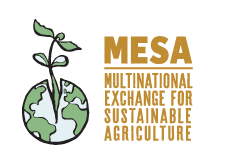In June, program manager Leah Atwood attended MESA’s second Ecuadorian Alumni Reunion. Over 25 Steward alumni from eight different provinces were there, traveling up to 12 hours to reach the highlands of Riobamba.
[img_assist|nid=1358|title=Riobamba Reunion|desc=|link=node|align=left|width=164|height=110]
In June, program manager Leah Atwood attended MESA’s second Ecuadorian Alumni Reunion. Over 25 Steward alumni from eight different provinces were there, traveling up to 12 hours to reach the highlands of Riobamba.
From grassroots to government, MESA Steward Alumni are engaged in improving their country’s food system and practices in their home communities.
In June, program manager Leah Atwood traveled to South America to partake in MESA’s second Ecuadorian Alumni Reunion. Over 25 Steward alumni from eight different provinces made the journey to attend, traveling up to 12 hours to reach the central highlands of Riobamba. Riobamba is an agricultural city situated in the sierra region at 9,000 ft above sea level, home of Mount Chimborazo, Ecuador’s highest volcano.
The first two days of the reunion were hosted by the University of Chimborazo, where MESA alumni attended an agro-ecology summit organized by MESA’s Ecuadorian Global Partner NGO, Huayra Causay. The summit featured dozens of lectures and workshops about sustainable agriculture‘s role to revitalize the national food system and harness community goodwill. Professors and experts in the field (among them ten MESA alumni!) presented topics ranging from organic free-range chicken production to grey-water irrigation to improving nutrient density in rural community diets. Despite sharing the weekend schedule with the FIFA World Cup semifinals, over 120 students joined with our alumni to share and contribute ideas!
After the summit, MESA’s group veered off the main road to what was once a family farm and is now the EcoVida retreat center, a fiscal sponsoree of MESA. Amidst fallow fields in a sunny adobe bungalow, the group spent two more days learning about each other (many MESA alumni from different program years hadn’t ever met), their current work and forming links for future collaboration. Following hilarious icebreakers and thought provoking bonding exercises, alumni divided into six focus groups. Each group developed action plans to bridge and advance their current work, create new projects, and facilitate collective action to change Ecuador’s agricultural policies and food practices.
The six focus groups were titled:
1. Urban Agriculture Introduction and Adoption;
2. The Recovery of Ancestral Agro-ecological Techniques in Rural Communities;
3. The Development of Organic Fertilizers and Pesticides for Sustainable Production and Consumption;
4. MESA Alumni Online Newsletter;
5. Eco-tourism and Farming Exchange;
6. Sustainable Agriculture Training Accreditation Program
Following the reunion, Leah visited two Home Country Projects by MESA Stewards who are busy making dramatic changes in their regions. Check out two project visit summaries from her travel journal below:
2008 program alumnus Silvana Bastidas, whose U.S. hosts Contented Acres and ALBA provided exceptional training to promote sustainable agricultural systems, currently works for the Ecuador Ministry of Agriculture. Upon Silvana’s return to her hometown of Ambato, she helped open a store based on similar principles as a CSA (Community Supported Agriculture). [img_assist|nid=1362|title=SilvanaCSA|desc=CSA Box|link=node|align=left|width=350|height=234]The store sources from ecological growers within 100 miles and contracts with customers who are willing to pay either annual or monthly dues. They also accommodate buyers wanting to make single purchases. With the help of happy customers, the client base is growing steadily. The store opened in May of 2010 with 12 members and now has 34! The store introduces consumers to new fruits and vegetables by providing information about nutritional benefits, cooking recipes, and tips for helping kids eat and enjoy (!) vegetables. Store customer Veronica Cedeno said the reason she prefers to shop there is because she knows where her food is coming from and that it will not make her or her family sick. To quote Veronica: “I know I am going to die at some point, but I’d prefer it not to be as a result of eating human-made toxins on my food.” I think we would all agree.
[img_assist|nid=1363|title=Park as landfill|desc=|link=node|align=left|width=234|height=156]Henrry Pasquel completed his MESA program in 2007 at the San Pasqual Academy (SPA) Farm Program in Escondido, CA where he contributed abundant energy and insight to their educational garden and burgeoning CSA, and introduced sustainable agriculture to adolescents at SPA’s extraordinary residential high school for foster youth. Henrry’s MESA program experience, combined with his own background in community activism, proved a potent mix for his return home to Quito, Ecuador. He hit the ground running, transforming what was once a landfill on the outskirts of Quito into a community park featuring a theatre, soccer fields and a blooming agro-ecology program. [img_assist|nid=1364|title=|desc=|link=node|align=right|width=234|height=156]Henrry has organized a weekly pick-up route on a three-wheeled bicycle, to collect green waste from 30 households in the neighborhood of Carceln Bajo. All the compost goes into the park, where the heaps are mixed and turned. Every weekend, community members and children attend classes and activities in the garden and community center, learning how to decrease waste, create rich soil, and grow fresh food.[img_assist|nid=1365|title=|desc=|link=node|align=left|width=315|height=211] Henrry now has a waiting list of members who would like to contribute their green waste. He hopes to get the city on board to support a green waste program in the future; in the meantime, Henrry’s compost pile is expanding by the bicycle load!
